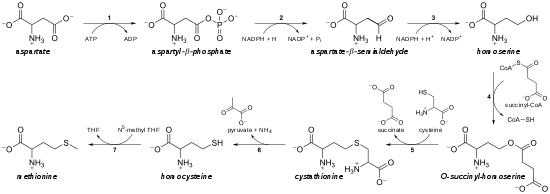Contents
It is an irreplaceable sulfur-containing amino acid that is part of proteins. It is used by the body during the synthesis of adrenaline, choline, cysteine and other substances necessary for the body.
Methionine rich foods:
General characteristics of methionine
Methionine is a colorless crystals, readily soluble in water, with a specific, not very pleasant odor. Methionine belongs to monoaminocarboxylic acids. In the human body, acid is not produced on its own, therefore it is considered irreplaceable.
A large amount of methionine is found in casein, a substance found in milk and other foods. An artificial analogue of methionine is produced in the form of a medical preparation, and is also used in animal husbandry, and is part of preparations for sports nutrition.
Daily need for methionine
According to official medicine, the daily requirement for methionine is, on average, 1500 mg.
The need for methionine is increasing:
- in case of poisoning with chemicals;
- during pregnancy (prevents the development of defects in the nervous system in the fetus);
- during the treatment of alcoholism and removal of alcohol intoxication;
- with chronic fatigue syndrome, depression;
- with liver diseases (dyskinesia of the biliary tract, obesity of the liver, stones in the gallbladder);
- with multiple sclerosis of blood vessels, arthritis, fibrocystic mastopathy;
- if you are overweight;
- diabetes mellitus;
- with senile dementia (Alzheimer’s disease);
- with Parkinson’s disease;
- with fibromyalgia;
- after illnesses to strengthen the immune system.
The need for methionine decreases:
- with chronic liver failure;
- diseases of the cardiovascular system;
- with hepatitis A;
- with individual allergic reactions to methionine;
- with high blood cholesterol levels.
Digestibility of methionine
It is believed that methionine is 100% absorbed.
Useful properties of methionine and its effect on the body
- methionine reduces the level of bad cholesterol in the blood;
- participates in the synthesis of choline, adrenaline and creatine. In addition, it is required in the synthesis of cysteine and other biologically important compounds;
- participates in the activation of the immune system, and also ensures the full functioning of the NA;
- helps to remove toxins from the body;
- improves the regenerative capacity of the liver and kidneys;
- cleanses the body of all kinds of toxins and free radicals;
- prevents skin and nail diseases;
- prevents the deposition of excess fat;
- strengthens strength, increases the overall tone of the body;
- has a beneficial effect on the course of Parkinson’s disease.
Interaction with other elements:
Methionine in the human body interacts with proteins, fats and carbohydrates. In addition, it has a beneficial effect on the production of enzymes.
Signs of a lack of methionine in the body:
With proper balanced nutrition, methionine deficiency rarely occurs, but this condition can cause the following changes in the body:
- liver damage;
- edema;
- fragility of hair;
- delayed development of the fetus and newborn;
- malformations of the nervous system in children.
In addition, a lack of methionine can lead to severe mental disorders.
Signs of excess methionine in the body:
- allergic reactions;
- nausea and vomiting;
- some people feel sleepy.
Pregnant women and nursing mothers should not take methionine without first consulting a doctor. In addition, those taking oral contraceptives should also visit their gynecologist, due to the fact that methionine increases estrogen production.
Methionine can aggravate the symptoms of liver and heart disease. Negatively affect the development of atherosclerosis. Patients with increased gastric acidity are generally not advised to consume methionine-rich foods.
Factors affecting the content of methionine in the body
- correct functioning of the gastrointestinal tract;
- full assimilation of methionine in the body;
- the presence in the diet of foods rich in methionine.
Methionine for beauty and health
A sufficient amount of methionine in the body has a beneficial effect on hair growth. In addition, methionine is an excellent antioxidant that actively fights the signs of aging in the body. It activates the work of the gonads, thanks to it, the condition of the skin improves, a blush appears on the cheeks.










